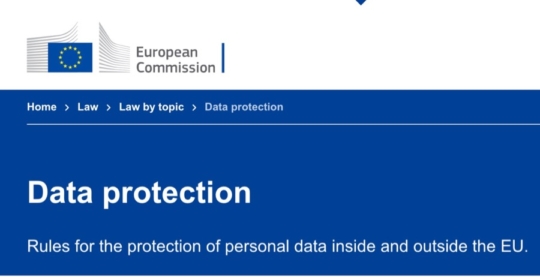Why journalists should welcome the new EU General Data Protection Regulation (GDPR)

On May 25, 2018, Internet users around the world suddenly began seeing notices about new privacy protections at popular websites. A European Union law regulating the collection and use of our personal data went into effect and, because the Internet is global, everyone is involved in the effort.
The hundreds of journalists we represent at the International Association of Religion Journalists (IARJ) almost certainly were informed about this new General Data Protection Regulation—probably by its initials GDPR. Large and small media companies all had to comply, but the resulting flurry of emails and memos that have crossed our members’ desks may have seemed more like a bureaucratic burden than important news.
In fact, we believe that journalists should welcome the GDPR. And the IARJ, of course, is fully complying with the new law.
We All Value Plain and Clear Language
What’s not to like about a law that in at least a half dozen places stresses that media companies should communicate with people in plain and clear language?
One of the core values journalists share is transparency.
Here’s just one passage from the new law in English:
The principle of transparency requires that any information and communication relating to the processing of those personal data be easily accessible and easy to understand, and that clear and plain language be used.
That’s why this information is coming to you as a plain-and-clear column posted on the front page of our IARJ website. We’re not sending this information to you as a mind-numbing disclaimer packed with small-print legal jargon. We’re journalists. We celebrate clarity.
What We Collect and Why
The first major goal of this new law is to let visitors to our website know what information we collect about them. Journalists who work for major media outlets will discover that their companies use a host of sophisticated cookies and other tracking software to mine data on web users. Here at our much simpler IARJ operation, we basically collect personal information in three categories:
Our Core Contributors
We ask our IARJ board members and other officers to allow us to list their names and some basic contact information, usually an email address. We also collect and make public that information for writers who contribute columns to our website. We always ask, in advance, if we can list this information. And we never allow our core-group email list to be used by third parties.
Our Members
If you click on the button to Become a Member,
you will be asked to share some basic personal and professional information. Then, you will be asked to check boxes if you would like to receive our emailed newsletters. The information you enter is sent to IARJ Co-Managing Directors and Web Editors Larbi Megari, based in Algeria and the Arabic-language specialist with IARJ, and to Elisa DiBenedetto, based in Italy, who handles other languages.
Elisa and Larbi look at the incoming information to confirm that applicants really are working journalists. They politely decline to allow others to join—as a safeguard against advertisers or activists who are not actual journalists. They correspond with new members to confirm their requested connection with the IARJ and, with the agreement of those new members, they save their information in our membership database. We never share our internal list of members with third parties. If an occasion arises when an event or a special opportunity may be relevant to journalists from a particular part of the world—we contact those journalists directly and ask if they care to be connected. Only with their permission would we make such a connection. That is entirely consistent with the new GDPR rules.
Our Email Newsletters
We use best practices in maintaining our email newsletter database. Emails arrive with an option to unsubscribe. That’s the third area in which we save data, and the newsletter operation already is GDPR-compliant.
Your Right of Access
The GDPR talks a lot about our right to access personal information saved by websites. In fact, here at the IARJ, we welcome inquiries from our members about what information we have stored about you. We would love to update your information to more effectively keep in touch. Journalists frequently move throughout their careers. We’re sure that some of our membership information needs updating.
Please, contact us and update your professional information. That will allow us to serve you better as opportunities and events arise that may interest you.
As the GDPR says, it’s your right. In our view—we welcome such inquiries.
Right to Erasure
Finally, the GDPR stresses that people should be able to request an erasure of the information a website has saved about them. And, of course, we fully support that concept. Journalists also are especially prone to working in dangerous corners of the world. Even one of our long-time members may occasionally need to contact us and request an erasure of information—perhaps removing some public reference on our website. Please, we welcome all inquiries. We are ready to work with you on these matters, should they arise.
You can contact IARJ Media Consultant David Crumm at or Larbi at or Elisa.
Care to read more?
Please follow the IARJ on Twitter and Facebook. If you sign up for our Twitter feed, you’ll see some interesting examples of coverage of the Jewish High Holidays featured in our news items. Also, encourage friends to follow our Twitter feed, which provides fascinating news from around the world in several languages. The IARJ Twitter feed will give you a far more diverse window into the world’s religious and cultural diversity. If you are a journalist covering religion, consider becoming a member of the IARJ.
